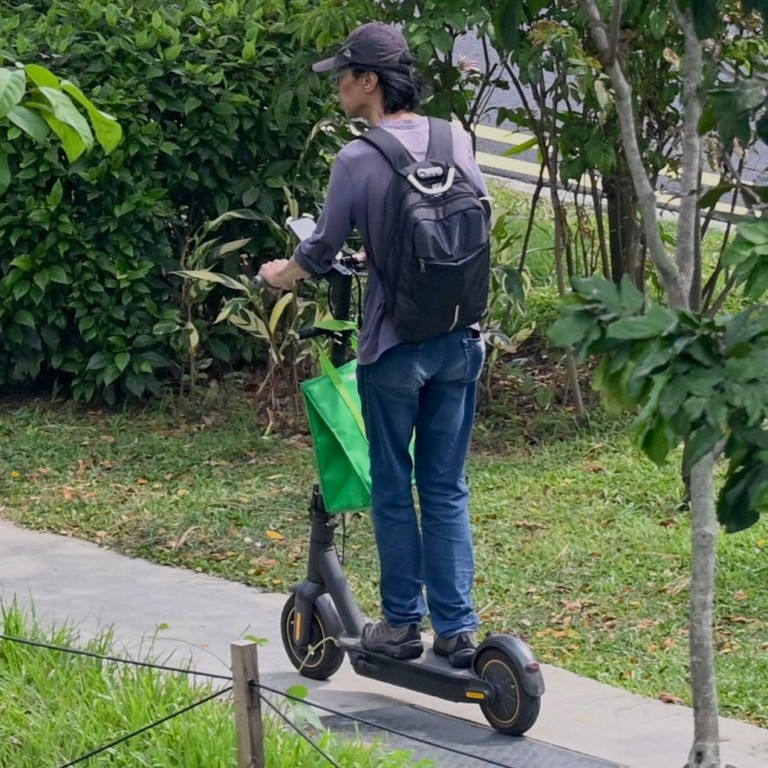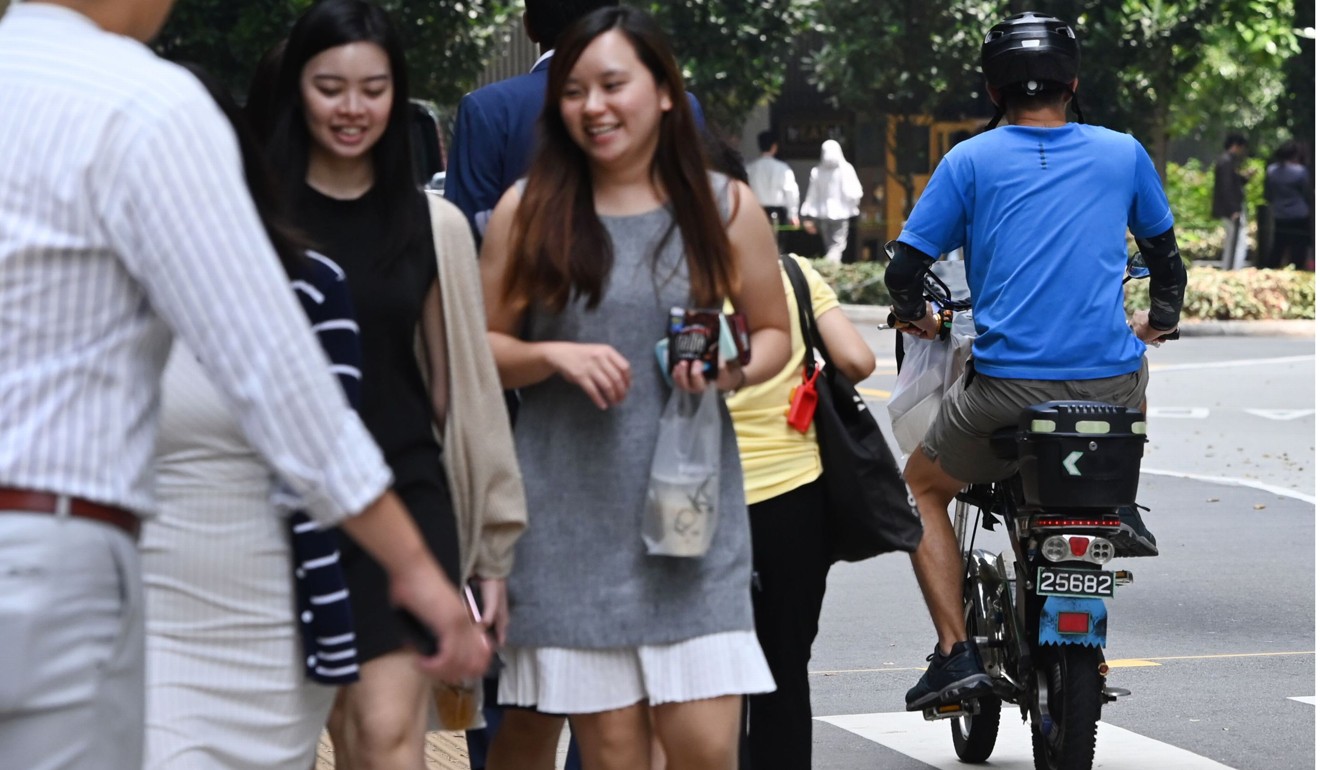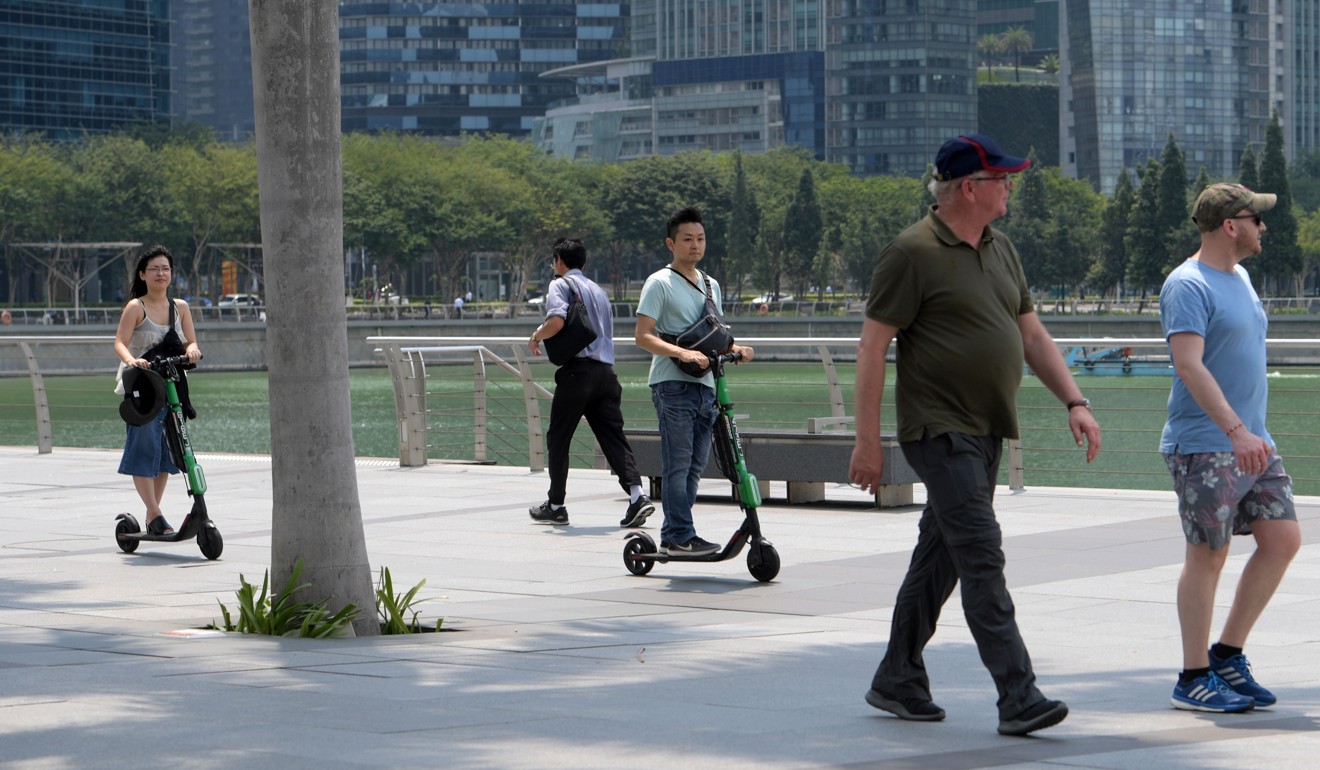
Singapore’s e-scooter footpath ban puts brakes on food delivery riders’ earnings
- Singapore has banned all electric scooters from footpaths, following a rise in accidents involving personal mobility devices
- But this means many food delivery riders who invested in the devices are now out of pocket
Security officer Abdul Haleem Mohd scrimped on his expenses last month so he could buy an electric scooter and become a food delivery rider. He wanted more flexible working hours to care for his elderly mother, who has dementia.
“The ban was very disappointing. I have been thinking of moving [to food delivery] full-time to take care of mother,” said the 37-year-old.
Besides e-scooter retailers, food delivery riders who relied the devices were caught off guard by the ban, which the government maintained was justified following the rise in accidents and the number of offenders using machines that did not comply with the safety standards it imposed.

Hundreds of riders have since descended on weekly constituency meetings chaired by their members of parliament to air their grievances, pointing out they were making an honest living but had been made victims of the behaviour of a few black sheep.
The uproar came despite measures to help riders defray the cost of switching to other types of personal mobility devices, including bicycles and electric bikes.
The S$7 million trade-in grant by the government and Singapore’s main food delivery companies – Deliveroo, Foodpanda and Grabfood – will help some 7,000 affected individuals.
Grab said in a statement that it has stopped taking in riders who use personal mobility devices (PMDs) – an umbrella term for motorised scooters, hoverboards and unicycles – as a mode of delivery, and it is still looking for solutions for its e-scooter riders.

Desmond Ho, a full-time Grabfood rider, said the government was “trying hard” but the grant was not viable as not all existing PMD users would want to switch to bicycles.
“If they are keen, they would have done that instead of buying PMDs,” he said, adding that many riders have spent a considerable sum of money buying devices that are approved by Singapore’s transport ministry.
In August, the ministry introduced stricter rules for PMD users, requiring them to not only register their devices but also pass an electrical and mechanical test.
Ho said most riders had hoped they could earn money through food delivery to pay for their mobility devices, but have ended up with a “huge loss” instead.
I invested in this e-scooter for work but in the end, I got played out … We are suffering
Mohd also voiced similar concerns, saying the ministry-approved devices were more costly. “I invested in this e-scooter for work but in the end, I got played out,” he said. “[The grants] are not doing anything for us. We are suffering.”
He now has to stick to his part-time security job, and described the blanket ban of e-scooters on footpaths as “unfair”.
Mohd felt that only the reckless riders should be held accountable for their acts, and those who have followed by the rules should be allowed on footpaths.

Ho agreed, saying riders should not be penalised for the actions of a few offenders. “It affects not only people’s livelihood who depended on this device, but also almost hundreds of thousand [of people] who use them daily for commuting.”
With the new ban, Ho would have to push his device in sections outside the allowed areas, which are park connector networks and bicycle lanes.
Electric scooters, unicycles, hoverboards … why can’t Singaporeans just walk?
Singaporean transport researcher Walter Theseira said the government had underestimated the human impact the policy change would have, even though they had consulted food delivery companies.
“What caught [them] by surprise was the fact that so many of the riders essentially felt that they have no alternative and that their livelihood was being destroyed by the decision,” said Theseira, an associate professor at the Singapore University of Social Sciences.

But officials are adamant that the ban is here to stay.
Lam Pin Min, Singapore’s senior minister of state for transport, told a group of 300 food delivery riders and vendors at his weekly meet-the-people session on Tuesday, November 12, that it was a “difficult” decision for the government.
At a separate session, Minister for Law and Home Affairs K Shanmugam said the government had “to be fair” to victims of PMD-related accidents, reported Singapore media.
Is Singapore on the right path with tighter rules for e-scooters and hoverboards?
In hindsight, the Singapore government should have discussed the new policy with all relevant stakeholders beforehand, considering arguments from both sides, instead of announcing it as a “surprise”, said Theseira.
But Singaporeans were getting “more vocal” by the day as they increasingly expressed concerns for their safety due to the rise in the number of PMD-related accidents, he said.
It’s not the end. I believe PMDs will be back, but they can only come back in a city like Singapore
Meanwhile, Pritam Singh, chief of the opposition Workers’ Party, has said that PMDs “will make a comeback” after regulations are fine-tuned and infrastructure catches up.
Theseira said mobility devices will also be the future for sustainable cities, as there is no other technology as efficient for solving residents’ short-ranged mobility needs.
New residential towns in Singapore have been designed to include PMDs as an integral part of the transport system, he said, and there are talks to designate certain footpaths to make them PMD acceptable.
“It’s not the end. I believe PMDs will be back, but they can only come back in a city like Singapore when we have engineered the local infrastructure to accommodate them,” said Theseira.

